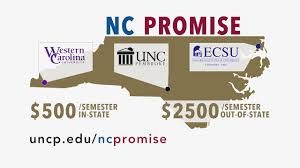Story co-written with Ruth Dahl. Story was published in The Sylva Herald on March 4, 2020.

WCU Homecoming parade 2011. Photo by Meredith Oakley
As the impasse between Governor Roy Cooper and North Carolina Republicans involving the State Budget continues, Western Carolina University faces another financial issue: the cost of accepted students.
Chancellor Kelli Brown has asked the university’s Executive Council to begin thinking of strategies to potentially limit or reduce WCU’s rate of enrollment growth by potentially as early as fall 2020.
“Although slowing the rate of enrollment growth could negatively affect access for North Carolina students planning to enroll at WCU, Chancellor Brown feels that we cannot in good conscience continue to sustain the level of growth we’ve seen in an era of unprecedented budget uncertainty,” wrote WCU Chief Communications Officer, Bill Studenc, in an email statement.
As Studenc explained the budget stalemate means WCU has money to maintain current operations, “but we do not have additional new money to support our growth and other critical priorities.”
The chair of the Faculty Senate and professor in physics and astronomy, Dr. Enrique Gomez, said that WCU and all of 17 campuses in the UNC system are operating on last year’s budget regardless of their growth. However, because of NC Promise, the burden on WCU is more critical.
“We are actually more heavily dependent on money from the state to essentially make up for the tuition break that students get. When the federal government does not pass a budget unless there’s a continuing resolution, it completely shuts down,” Gomez said.
According to Gomez, WCU is essentially operating “as if it were 2018,” meaning with an unchanged budget. This perhaps wouldn’t be a problem if nothing had changed on campus in the past two years. However, WCU has experienced record enrollment for the past three years, with enrollment increasing nearly 30% since 2008. In 2018, WCU’s total enrollment was 11,639, while 2019 saw a total of 12,167 students—a 4.5% increase after just one year alone.
 “We’ve had really rapid growth over the last few years and particularly in the Arts and Sciences because we provide a lot of liberal studies,” the Interim Dean of the College of Arts and Sciences, Dr. David Kinner, said. He explained the planed growth for WCU was around 300 students per year, but the growth proved to be more rapid than expected. “The first couple of years we had with NC Promise we ended up having (growing) by around 600 students a year,” Kinner added. This growth is with first time students and transfer students combined.
“We’ve had really rapid growth over the last few years and particularly in the Arts and Sciences because we provide a lot of liberal studies,” the Interim Dean of the College of Arts and Sciences, Dr. David Kinner, said. He explained the planed growth for WCU was around 300 students per year, but the growth proved to be more rapid than expected. “The first couple of years we had with NC Promise we ended up having (growing) by around 600 students a year,” Kinner added. This growth is with first time students and transfer students combined.
NC Promise is a tuition plan made with the intention of making higher education affordable for as many people as possible. Through NC Promise, the state reduces the cost of tuition to $500 in three UNC Universities (WCU, Elizabeth City State University, and the University of North Carolina at Pembroke). This is intended to increase the accessibility of university education and reduce student debt.
“The way NC Promise works is basically for whatever we’re charging, the legislature makes up the difference between them,” said Kinner.
In seeing WCU’s increased enrollment in the past few years, it’s hard to argue that NC Promise hasn’t been effective in increasing the accessibility of higher education. The early consensus has been positive—with it, out-of-state students at WCU can save around $10,000.
But the budget impasse means that there is no extra money in the budget for NC Promise. The worry is not the loss of NC Promise, because no matter what happens with the Impasse, students going to the three NC Promise schools will still receive the cut tuition price of $500. However, the worry is that with the rapidly growing student body, money that previously would have gone to other projects is now going to have to go to filling the tuition gap NC Promise creates. Of top concern at the moment is WCU’s aging steam plant, which could cause drastic problems on campus if it were to fail.


